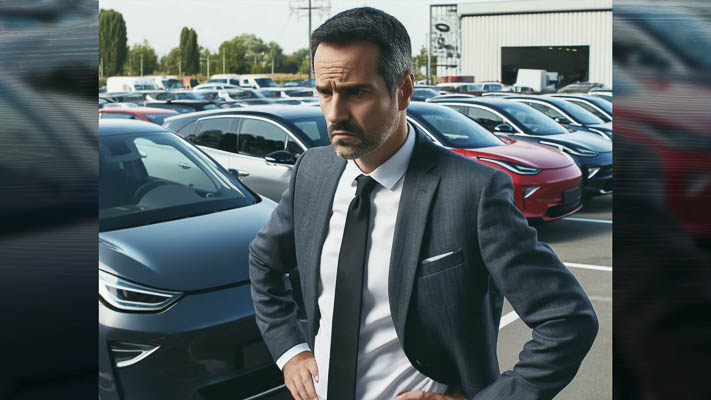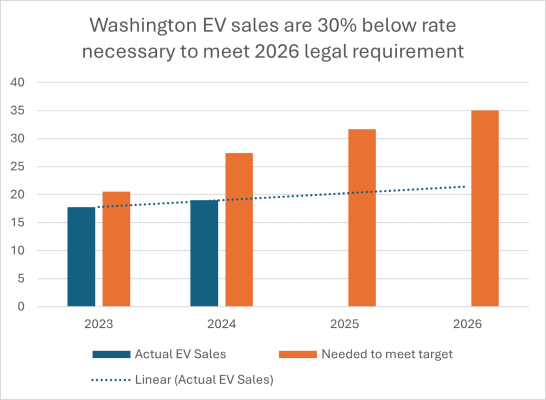
Todd Myers believes, ultimately, Washington’s EV requirement is needlessly expensive and restrictive
Todd Myers
Washington Policy Center
If we want a stark example of Washington state’s needless waste in climate policy, perhaps the best place to look is at the many expensive and duplicative policies on electric vehicles. In addition to the tax on CO2 emissions which caps on how much gasoline can be sold in the state, there is the low-carbon fuel standard which subsidizes installation public EV charging stations, tens of millions in state subsidies for EV purchases, and the state’s 2030 goal to have 100 percent of vehicle sales be electric (which the state Department of Commerce itself says cannot be met).

On top of all that, add Washington’s adoption of California’s zero-emissions vehicle (ZEV) mandate which takes effect in 2026. Not only is Washington very unlikely to meet the first required target in 2026, the Department of Ecology may have illegally made the rules more restrictive.
Washington state adopted California’s requirement that 100 percent of new vehicles be electric or plug-in hybrid (EV & PHEV) by the year 2035. The regulation mandates a gradual increase, starting with a 35 percent requirement in 2026.
It is unlikely that the state will meet even that initial goal, and attempting to do so is likely to be extremely expensive. The state’s own analysis shows Washington is behind where it needs to be to achieve the 2026 target.

According to the state’s estimated glidepath to reach 35 percent by 2026, about 20.5 percent of new sold cars in the state should have been EV & PHEV last year. Using a third-party estimate, the state claims that 18.8 percent of new vehicles sold in the state met that definition. This is higher than the percentage of new registrations in the state for new model EVs & PHEVs in 2023, which is about 17.8 percent. That second definition is the one Ecology staff say the law requires. The number being touted by Ecology in their press releases doesn’t appear to meet their own interpretation of the law.
For the first quarter of 2024 the percentage of new EV & PHEV registrations increased to about 19 percent. That is still lower than the rate necessary to stay on track to meet the 2024 goal of 27.4 percent. To stay on track, about 30 percent of new vehicles sold during the rest of the year will need to be EV & PHEV.
That is very unlikely to occur, even with the huge new taxpayer subsidy Governor Inslee recently announced. The state estimates that subsidy will put 8,767 new EVs on the road. Assuming all those purchases would have been gas-powered vehicles without the subsidy (which isn’t true), 27 percent of all new vehicles sold the rest of the year would still have to be EV or PHEV. And that assumes all $45 million in taxpayer subsidy is spent this year, meaning that another massive new subsidy would be required next year.
There is another problem. The large difference between the state’s claim (based on third-party information) that 18.8 percent of new cars sold in the state during 2023 were EV or PHEV and the state’s own registration number of 17.8 percent, indicates the Department of Ecology may be applying the law incorrectly.
Washington’s EV requirement, WAC 173-423, adopts California’s targets and rules by reference. According to staff at California’s Air Resources Board (CARB), their “zero-emission vehicle (ZEV) sales requirement applies to vehicles delivered for sale in California. It does not apply to the sale of used vehicles to new owners or to vehicles brought into California that were originally sold in another state.” (emphasis mine) If someone went to Nevada and bought a gas-powered vehicle, it is not considered by California’s law.
The Washington State Department of Ecology, on the other hand, says new cars purchased outside the state are counted toward the targets. In an email to me, Ecology staff wrote, “new vehicles purchased out of state and brought to Washington are counted towards manufacturers’ sales requirements under Washington’s Zero Emission Vehicle standard.” (emphasis mine) That directly contradicts California’s interpretation of its own law and appears to be illegal.
State law instructs the Department of Ecology to “adopt rules to implement the motor vehicle emission standards of the state of California, including the zero emission vehicle program, and shall amend the rules from time to time, to maintain consistency with the California motor vehicle emission standards…” Since California’s law does not apply to vehicles purchased outside the state, interpreting the law to include new vehicles sold out of state is contrary to what the legislature adopted. Rather than doing what the law requires – simply replicating California’s law – Ecology staff have added new, more restrictive requirements.
This isn’t a trivial difference. Car dealers in Washington would be accountable for cars purchased in Idaho and Oregon and brought into the state. Including those vehicles would make it more difficult, and costly, to meet the target.
Ecology Director Laura Watson said Ecology would not look at the economic impact of the rules because the agency was required to simply adopt California’s rules. They used the fact that the rules were the same as an excuse to limit public input. If Ecology didn’t do that and made the rules even more restrictive, they dodged the economic analysis perhaps because they knew the results would be bad.
Ecology Director Watson and Ecology staff need to explain why their interpretation of California’s law is so different from CARB’s. If they can’t, the WAC needs to be changed because it is out of compliance with Washington state law.
Ultimately, Washington’s EV requirement is needlessly expensive and restrictive. According to the state’s own timeline, the state is unlikely to meet the goal that is just two years away, even with the injection of tens of millions of taxpayer dollars to prop up EV sales. The fact that the requirement is needlessly duplicative makes these problems even more pointless.
Todd Myers is the director of the Center for the Environment at the Washington Policy Center.
Also read:
- Opinion: Eyes on the Board ActJulie Barrett believes The Eyes on the Board Act is not just good policy, but it may be the very thing that starts turning our education system around and getting our students back on track.
- POLL: Do you believe the city of Vancouver should be required to get public approval to take away traffic lanes as part of its Complete Streets ordinance?Do you believe the city of Vancouver should be required to get public approval to take away traffic lanes as part of its Complete Streets ordinance?
- Letter: May is Mental Health Awareness MonthVancouver resident Wynn Grcich asks how Dr. Alan Melnick’s study on racism in health care going to benefit anyone?
- Opinion: Anonymous letter shows how nasty the education debate can becomeLiv Finne of the Washington Policy Center offers anecdotal evidence of how mean-spirited the public debate over education can become.
- Opinion: Restore Election Confidence Initiative signature-gathering effort nears deadlineThe Restore Election Confidence (REC) Initiative is in its final stage of signature gathering, with a deadline set for May 25, 2024.










